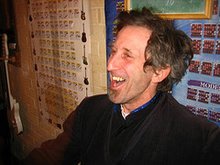I spent some time at New Critics in a long thread with some of Ayn Rand's supporters (not indigenous to New Critics). I came to the conclusion that there is a cult-like quality to her followers, in which she is a prophetess and they her adherents.
In a lot of ways it was a very enjoyable discussion, until it became obvious that they accept no argument that isn't already part of their creed. They use their version of the language of Objectivism, and the definitions that go with that language to create circular arguments, the discussion never really goes anywhere because their sole purpose is proselytizing the Randian POV as if it were theological truth, rather than just post-theological rationalism.
They believe Capitalism is good, collectivism is evil, and that man's right to do as he pleases with the environment is good, while environmental romanticism is evil; selfishness is good, altruism is evil.
I certainly don't profess to know much about Rand, and nor am I particular interested anymore. I was when the thread began but then I ran into her camp followers and realized I have better things to do.
The whole question of objectivism/rationalism intrigues me. I tend to be rather invidualistic in the way I have constructed my thought, for instance, from the theologian Francis Schaeffer I used his explanation of pre-suppositional philosophy to help me understand a statement by the Canadian rebel of the 1830's, William Lyon MacKenzie - who noted that 'a mind of character was created by the sequence of its ideas.' Schaeffer believed that there were three pre-suppositions about the nature of existence, and that depending on which of the three you chose, the rest of your ideas about life would flow from there.
The three presuppositions are that life was created, life is random and life is an illusion. By Schaeffer's estimations only a created universe could account for everything from rational thought to imaginative art. A random universe would only yield randomness and could only be said to produce a rational universe when a proponent left their presupposition behind them as soon as they chose it. That abandonment of the random choice immediately after its articulation enabled them to hop the tracks as it were and so ride the train that was pulling out on the tracks that followed the sequences of ideas of a presupposed created universe. Similarly no one can actually live in a world in which they think everything is random so too no one can live in a world in which everything is thought to be Illusory.
Faith to Schaeffer was rational precisely because presuppositional philosophy and the choice of believing in a created world was the only choice which explained why choice had meaning. The existence of meaning cannot be explained by randomness, not even the word random can be explained by randomness. It's like believing in 'spontaneous generation' on a cosmic scale. It's surprising how many scientists seem to believe in cosmic spontanenous generation.
I realize that notions of a created universe give some people the creeps, but as far as I'm concerned, as a presupposition it's still the only one that accounts for meaning. 'Creationists' like Objectivists come in many flavours. Those who choose randomness because they despise one flavour of creationism still have to
hop onto the creation bandwagon because the sequence of ideas that flow from a world governed by meaningful laws will not flow from spontaneous generation
Ayn Rand's philosophy is post-theological, and while she doesn't believe Man created the universe, for her, every individual is a god, and his reason is everything. Man's emotional intuition is not only meaningless to Randians, but appears to be regarded as conceptually evil. Rationalism is the source of understanding to them because intuition in their thought appears to be anti-rationale. Creative objectivism finds understanding in the emotional as well as the intellectual, because everything has meaning, and not just the rational. If it exists, it has meaning. And there is plenty of evidence for the existence of intuition, Ayn Rand's views notwithstanding.
Having said all that, the sequence of ideas that follow the presupposition of creation do not lead directly to 'Creationism' or anything else, each idea is chosen (in each case by an individual, whether by acquiescence to stronger willed people, or by conscious decision)thus what I mean by a created universe, while similar in some ways to what Schaeffer meant by it is distinctly personal.
Because Randians take the notion of evil from Theology to describe things they don't like, but place man at the centre of the universe, it is quite evident that their views of evil flow from Rand herself, or least from Rand's conception of Objectivism, which makes Randians practitioners of a form of Creative Objectivism, but with Rand has the creator of their sequential thought.
Evil, as a theological understanding is discerned by the spirit, not conceived through rationalizations. If fact, one could argue that rationalization is a demonic parody of discernment.
For Randians, common good is evil not because it can be discerned to be so by the spirit but because in the self-centric random-creative objectivism of Ms. Rand, she rationalizes it to be so because it gets in the way of self-fullment, and we should take her word for it, like her followers have. It remains however a random deduction made by a human god and in fact denies my rights has an individual to believe that self-sacrifice is sometimes the only thing that makes rational sense or intuited far-sightedness.
Granted, certain forms of self-sacrifice are not genuinely self-sacrificial at all, but rather a twisted form of 'other'-sacrifice into which people in authority brow beat or bully the impressionable, much like soldiers who believe political lies and lay down their lives for those lies, or like workers who die in unsafe working conditions because bosses demand they do things they shouldn't.
To the degree that Ms. Rand promotes a certain form of heroic selfishness I can appreciate what she means, to the degree that she condemns self-sacrifice itself as evil, I think she's an idiot.
The sequence of her ideas that led her to her random pronouncements can be traced back to the place she jumped off her random presupposition and onto the train that began with a created universe. She borrowed the idea of objective reality and then preceded to make random declarations of what was good and what was evil, and called it new Romanticism.
From my perspective, in a created universe I can look at the word Rand and random and find a metaphorical dynamism that produces both rational and intuitive sense: something wicked this way comes, and it is masked as a source of light.
The 1100th Movement
Let's all head to the tipping point axle and hang ten.
Subscribe to:
Post Comments (Atom)


No comments:
Post a Comment